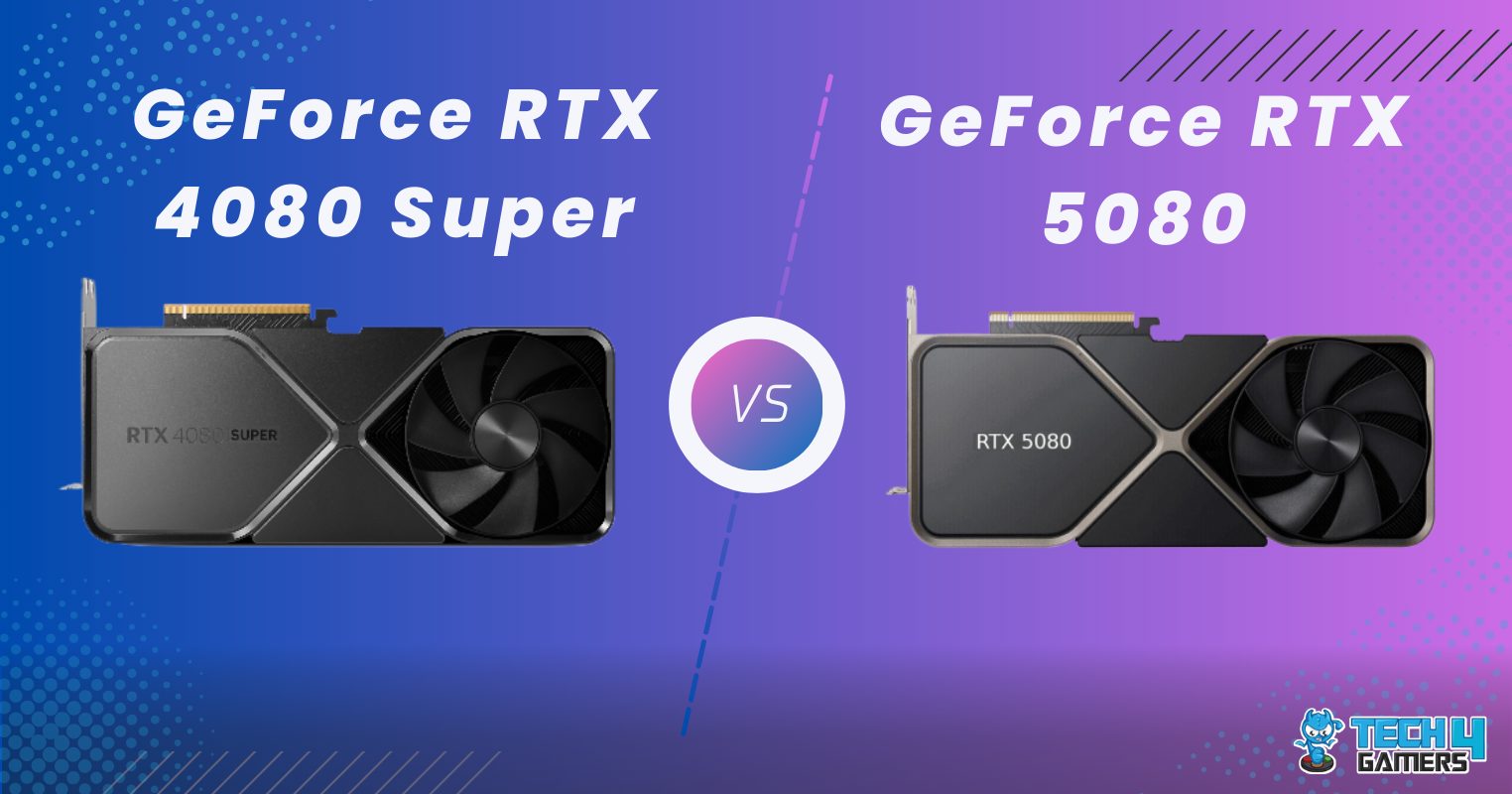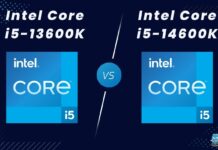NVIDIA GeForce RTX 4080 Super Rated: 8.4/10 NVIDIA GeForce RTX 5080 Rated: 8.6/10
Pros And Cons
| GPU | Pros | Cons |
|---|---|---|
| RTX 5080 | ✅ More modern fabrication process ✅ Better in terms of performance | ❌ Small performance uplift |
| RTX 4080 Super | ✅ Old enough to be bought used ✅ Lower power consumption | ❌ A larger design |
Comparison Table
| Feature | RTX 5080 | RTX 4080 SUPER |
|---|---|---|
| Architecture | Blackwell 2.0 | Ada Lovelace |
| GPU Codename | GB203-400 | AD103 |
| Texture Mapping Units (TMUs) | 336 | 320 |
| Render Output Units (ROPs) | 112 | 112 |
| Compute Units (Pipelines) | 84 | 80 |
| Tensor Cores | 336 | 320 |
| Ray-tracing Cores | 84 | 80 |
| Fabrication Process | 4 nm | 5 nm |
| Die Size | 378 mm² | 379 mm² |
| Transistor Count | 45.6 billion | 45 billion |
| Best Variants | - | Best RTX 4080 Super |
| Best CPU | - | Best CPUs For RTX 4080 Super |
Architectural Difference
- Process Nodes: The RTX 5080 has a 4nm manufacturing process, whereas the RTX 4080 Super has slightly older 5nm processing nodes.
- Clock Speeds: The older card has a base clock of 2295MHz, which the RTX 5080 matches, and a boost clock of up to 2550MHz. The RTX 5080 has a boost of up to 2617MHz.
- VRAM: Both cards have 16 gigabytes of VRAM over a 256-bit bus, but the RTX 5080 uses a more advanced GDDR7 memory type compared to the GDDR6X memory of the RTX 4080 Super.
- TDP: The TDP of the RTX 5080 is a bit higher at 360 watts compared to the 320-watt TDP of the RTX 4080 Super.
- Supported Technologies: The headlining feature of the RTX 5080 is its multi-frame generation, which will unfortunately not be coming to the RTX 4080 or any older generation.
Nvidia has launched the RTX 5080 to middling reviews, with most people criticizing it for only bringing a marginal performance improvement over the RTX 4080/4080 Super. What exactly is this difference, and is it big enough to justify the existence of the RTX 5080? Let’s fiind out!
Gaming Benchmarks – 4K
For most people, gaming will be the biggest use case of these graphics cards. The target customers will also expect excellent performance, so we will test these cards at 4K with everything cranked up to the maximum. The specs of the test bench we have used for this comparison are written below:
Test Bench
- OS – Windows 11
- CPU Cooler – Enermax LiqMaxFlo 360mm
- Processor – AMD Ryzen 7 9800X3D
- SSD – XPG Gammix S50 Lite
- Power Supply – be quiet! Dark Power Pro 13 1300W
- Mobo (AMD) – ASRock X870E Taichi Lite
Marvel Rivals

- The first game we tested had an average framerate of 65 FPS on the RTX 5080, which was 16% higher than the 56 FPS we saw with the RTX 4080 Super – a larger difference than we expected.
- Minimum framerates was 41 FPS on the RTX 5080, which was only about 5% higher than the 39 FPS we saw with the RTX 4080 Super.
Stalker 2

- In Stalker 2, the performance of the Blackwell card was 9% higher than its rival. It had a framerate of around 48 FPS, while the RTX 4080 Super got an average of about 44 FPS.
- Nvidia’s newer card performed about 14% better when it came to the 1% lows. It had a framerate of 41 FPS, while the older card hung around 36 FPS.
God Of War Ragnarok

- Our test of this game resulted in the RTX 5080 getting an average framerate of 117 FPS, which was about 8% higher than the 108 FPS of the RTX 4080 Super.
- We noticed a small difference in God Of War Ragnarok, where the RTX 5080 had a framerate of 98 FPS, only 3% higher than the 95 FPS of the RTX 4080 Super.
Warhammer 40K: Space Marine 2

- The average framerate was a whopping 21% higher on the RTX 5080 in Space Marine 2, with a framerate of 85 FPS compared to the 70 FPS of the RTX 4080 Super.
- There was a very noticeable difference in the 1% lows, with the RTX 5080 getting a framerate of 75 FPS, which was 27% higher than the 59 FPS of the 4080 Super.
Star Wars Jedi: Survivor

- Our Blackwell card took a notable 19% lead in the averages of Star Wars Jedi: Survivor with a framerate of 69 FPS, while the RTX 5080 trailed behind with a framerate of 58 FPS.
- The RTX 5080 got 1% lows of 58 FPS, about 23% higher than the 47 FPS of the RTX 4080 Super. This difference was a welcome improvement over the last generation.
Alan Wake 2 (RT High + DLSS Q)

- Alan Wake had both the cards struggling with its knobs and dials cranked up, with the RTX 5080 getting an average of 38 FPS while the RTX 4080 Super was 12% behind, getting a framerate of only 34 FPS.
- Performance as poor with both cards when it came to the 1% lows. The RTX 4080 Super had a framerate of 27 FPS in this regard, while the RTX 5080 was 15% faster with a less-than-ideal framerate of 31 FPS.
Cyberpunk 2077 (RT Ultra + DLSS Q)

- With high RT and DLSS quality, Cyberpunk ran with an average of 50 FPS on the RTX 5080, whereas the RTX 4080 Super was 6% slower with a framerate of 47 FPS.
- 1% lows were around 40 FPS on the RTX 4080 Super, while the RTX 5080 was only 2.5% or a single frame faster with a minimum of 41 FPS.
Black Myth Wukong (RT Very High + DLSS Q)

- Finally, Black Myth Wukong had an average framerate of 39 FPS on the RTX 5080, which was about 11% higher than the 35 FPS of the RTX 4080 Super, both with RT enabled.
- The minimum framerates were only a single frame apart, like our previous test, with the RTX 5080 getting 1% low of 29 FPS, just a tad ahead of the 28 FPS of the RTX 4080 Super.
Productivity Tests
Now that we have checked the performance of these cards in games, we will have a look at how they perform in productivity tests. The system we used for this part of the comparison is the same as the one we used for the gaming tests.
Blender Barbershop

- In our Optix render of the Barbershop scene in Blender, the RTX 5080 finished the render only about 5% faster than the RTX 4080 Super rendered the same scene.
- The RTX 5080 finished the render in about 41 seconds, whereas the RTX 4080 Super finished it in about 43 FPS.
Davinci Resolve

- We noticed a 16% lead with the RTX 5080 in Davinci Resolve using the Pudget Systems test bench, which was a noticeable advantage for the Blackwell card.
- Scores were around 11273 points for the RTX 5080, while the RTX 4080 Super hung closer to a score of 9726 points.
Premiere Pro

- There was a smaller 7% increase in performance with the newer card in Premiere Pro compared to the performance uplift we saw with the scores in Davinci Resolve.
- The RTX 5080 got a score of around 14252 points, while the RTX 4080 Super got a score of around 13350 points.
Overall Performance
| Processor | RTX 5080 | RTX 4080 Super |
|---|---|---|
| Average FPS | 📈66.87 | 📈56.5 |
| 1% Lows | 📉53.37 | 📉46.37 |
| Productivity (Rating) | ✏️9/10 | ✏️8.3/10 |
| Winner: RTX 5080 | ||
Average Framerate
On average, the RTX 5080 had very little improvement over the RTX 4080 Super, though some games did perform much better, like Space Marine 2 and Star Wars Jedi. Most games saw only a single-digit percentage improvement, though the RTX 5080 got 13% more improvement on average.
1% Lows
The minimum framerates suffered from the same problems that the averages had. The RTX 5080 had an average improvement of 12% in this regard, though most games only saw a few frames of improvement, with some outliers. Maxed-out settings seemed like too much trouble for both of these cards.
Productivity
We saw little performance uplift in the productivity tests as well, with the RTX 5080 only getting a substantial improvement in Davinci Resolve. This can likely be attributed to the new 4:2:2 encoding and decoding in the new cards, which give it a small yet noticeable edge in tasks involving video.
Power Consumption
| Game | RTX 5080 | RTX 4080 Super |
|---|---|---|
| Idle | 21⚡ | 19⚡ |
| Gaming | 326⚡ | 302⚡ |
| Ray Tracing | 333⚡ | 290⚡ |
| Maximum | 376⚡ | 318⚡ |
| Winner: RTX 4080 Super | ||
Surprisingly, the RTX 5080 took a noticeable amount more power than the RTX 4080 Super. It took about 8% in our gaming tests, whereas the spikes in power consumption were a whopping 15% apart. We will talk about how this change is disappointing in a later section.
Price
| CPU | RTX 5080 | RTX 4080 Super | Price Difference |
|---|---|---|---|
| Launch MSRP | 💲999 | 💲999 | 0% |
| Current Price | 💲999 | 💲1099 | 10.01% |
As of early February 2025, the RTX 5080 is 10% cheaper than the RTX 4080 Super, though this might change in the future because of scalping and supply shortages. Be sure to do your due diligence after reading this article if you wish to purchase either of these cards.
What We Recommend
RTX 5080: With a small improvement in performance and a regression in power consumption, the RTX 5080 is a very disappointing generational increment to the RTX 4080 Super. Sure, it has added some extra AI features, but apart from that, there is barely any difference.
RTX 4080 Super: Though not a spectacular card in its own right when considering things like price-to-performance ratios, the RTX 4080 Super did us a favor at launch by reducing the price of entry to an 80-class card by $200 and kept everything else about exactly the same.
In conclusion, the RTX 5080 seems more like an RTX 4080 Super Ti than a generational upgrade. With how similar both these cards are, we would advise basing your buying decision on the price and whether the new multi-frame generation is of value to you.
Yes, but barely. The RTX 4080 Super was more of an excuse for Nvidia to decrease the price from $1200 to $1000. Technically, yes, it does give you more performance for the same MSRP. However, the price of the RTX 4080 Super may fall a few notches in the future to equalize this. Despite its myriad shortcomings, the RTX 5080 is still the third fastest graphics card on the consumer market, beat only by the RTX 4090 and RTX 5090. If your game is running around the 60 FPS mark with no frame generation, multi-frame generation will likely have little distracting visual artifacts. For most cases with most people, upgrading from the RTX 4080 Super to the RTX 5080 is not worth it. FAQs
More From RTX 4080 Super More From RTX 5080
Thank you! Please share your positive feedback. 🔋
How could we improve this post? Please Help us. 😔
[Comparisons Expert]
Shehryar Khan, a seasoned PC hardware expert, brings over three years of extensive experience and a deep passion for the world of technology. With a love for building PCs and a genuine enthusiasm for exploring the latest advancements in components, his expertise shines through his work and dedication towards this field. Currently, Shehryar is rocking a custom loop setup for his built.
Get In Touch: shehryar@tech4gamers.com




![Ryzen 7 5800X Vs Ryzen 7 5700G [Tested In AAA Games] Ryzen 7 5800X Vs Ryzen 7 5700G](https://tech4gamers.com/wp-content/uploads/2022/11/Ryzen-7-5800X-Vs-Ryzen-7-5700G-218x150.jpg)


